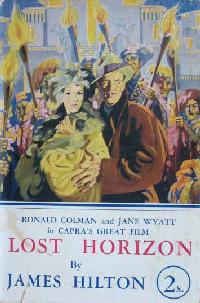
|
|
1933 US hardcover
|
|
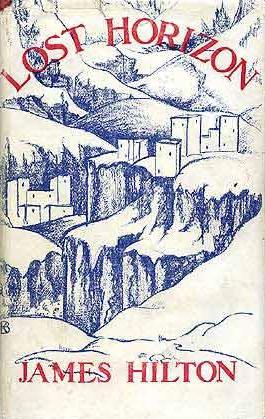
|
|
1943 Canadian hardcover
|
|
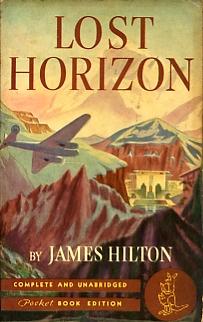
|
10th Pocket Books printing, 1940
PB No. 1
|
|
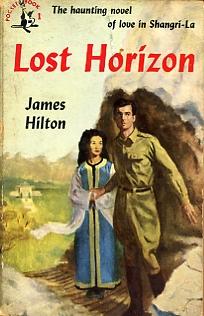
|
38th Pocket Books printing, 1952
PB No. 1
|
|
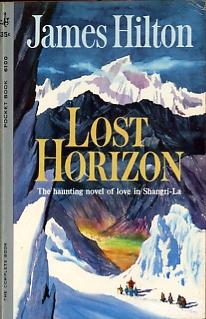
|
47th Pocket Books printing, 1962
PB No. 6100
|
|
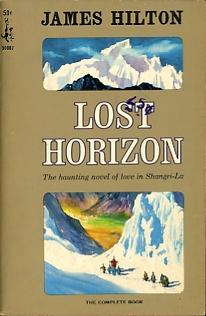
|
65th Pocket Books printing, 1967
PB No. 50007
|
|
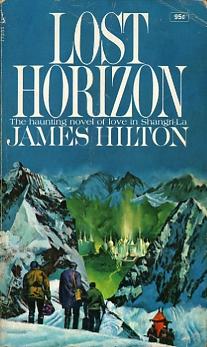
|
73rd Pocket Books printing, 1971
PB No. 77355
|
|
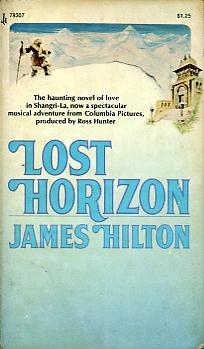
|
78th Pocket Books printing, 1973
PB No. 78307
|
|

|
|
3rd Pan Books printing, 1950
|
|
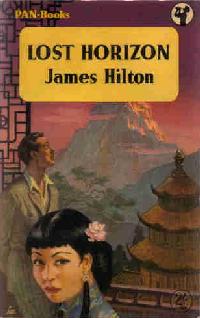
|
|
5th Pan Books printing, 1956
|
|
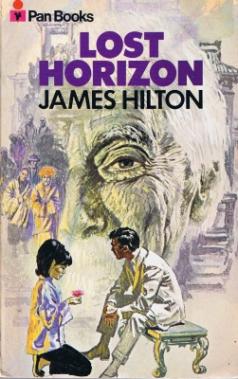
|
|
13th Pan Books printing, 1972
|
|

|
|
10th Pocket Book edition, 1940
|
|

|
Seven Years in Tibet
1st US edition, Dutton, 1954
Book-of-the-Month Club selection
|
|
James Hilton
Lost Horizon
Hardcover editions
New York: William Morrow, 1933
277 pages, hardcover
London: Macmillan & Co., 1933
Paperback editions
New York: Pocket Books, 1939 (1st)
London: Pan Books, 1947 (1st)
Lost Horizon (1933) is one of those once-in-a-century stories that will still be talked about a millennium later. It did not get that much attention until Goodbye, Mr. Chips (1934) was published the following year.
Chips versus Shangri-La
Goodbye, Mr. Chips has been the more popular work, with its several stage and screen adaptations, especially Peter O'Toole's musical film version (1969). Lost Horizon, though, gave the world Shangri-La which, unlike Chips, became a metaphor.
Not only has Lost Horizon inspired a number of other utopian novels (as we shall see later), but it is also the Godfather of hotels and bars the world over -- and everything from songs and boats to diets and space colonies. The Shangri-La Hotel in Singapore, the flagship for the Shangri-La group, has commissioned several printings of Hilton's novel for promotional use as complimentary copies.
Seven Years in Shangri-La
Shangri-La was the object of several Nazi searches. Heinrich Harrer's Seven Years in Tibet, first published in an English translation in 1954, is an account of how Harrer (1912-2006), then an SS sergeant, and Peter Aufschnaiter (1899-1973), a mountaineer, agriculturalist, and cartographer, escaped from British detention in India in 1944 and made their way through the Himalayas to Lhasa.
Harrer and Aufschnaiter stayed in Tibet until Chinese troops arrived in 1950. Hollywood appears determined to stay there forever.
Shangri-La Accords
Camp David is the name Dwight Eisenhower gave the recreational area Franklin Roosevelt first visited on 22 April 1942 in the Catoctin Mountains of Maryland 113 kilomters from the White House and called Shangri-La instead of Camp Hi-Catoctin. Roosevelt had the camp converted to a getaway and frequently escaped there, and Harry Truman made it an official presidential retreat in 1945, then in 1953 Eisenhower renamed it after his grandson.
Perhaps only John Lennon could have imaged the signing of a peace treaty called "Shangri-La Accords" after extensive "Shangri-La negotiations". Image a negoiator at the "Shangri-La summit" writing a memoir called "Shangri-La Diaries".
Doolittle Raid from Shangri-La
Image what sort of world we might have today if Eisenhower and later presidents had embraced Roosevelt's more romantic spirit.
Or perhaps we sould say his fighting spirit.
Asked from where the B25s on the Doolittle Raid on Tokyo on 18 April 1942 had flown, he said Shangri-La, not wanting to reveal that the planes had launched from the aircraft carrier Hornet -- then a secret.
Now in public domain in Australia, the entire text of Lost Horizon can be read on-line or downloaded from Project Gutenberg of Australia. Beware that the posted edition does not reflect British spellings, and some words have been changed to reflect a more American idiom.
While cutting and pasting from the Gutenberg edition, I have restored spelling, punctuation, and usage according to the third Pan Books printing. The page numbers, too, refer to this (and any 189-page) edition.
Thirty-seven-year-old Hugh Conway, an H.M. Consul in the British consular service (page 20), does not embrace the "East/West" dichotomy of the human condition that prevails among the company of "Westerners" he has to keep (pages 69-70).
The truth was, the puzzle of Shangri-La, and of his own arrival there, was beginning to exercise over him a rather charming fascination. In any case he found it hard to feel any personal misgivings. His official job was always liable to take him into odd parts of the world, and the odder they were, the less, as a rule, he suffered from boredom; why, then, grumble because accident instead of a chit from Whitehall had sent him to this oddest place of all?
He was, in fact, very far from grumbling. When he rose in the morning and saw the soft lapis blue of the sky through his window, he would not have chosen to be elsewhere on earth -- either in Peshawar or Piccadilly. He was glad to find that on the others also a night's repose had had a heartening effect. Barnard ["a U.S. citizen"] was able to joke quite cheerfully about beds, baths, breakfasts, and other hospitable amenities. Miss Brinklow ["of the Eastern Mission"] admitted that the most strenuous search of her apartment had failed to reveal any of the drawbacks she had been well prepared for. Even Mallinson ["H.M. Vice-Consul] had acquired a touch of half-sulky complacency. "I suppose we shan't get away to-day after all," he muttered, "unless somebody looks pretty sharp about it. Those fellows are typically Oriental -- you can't get them to do anything quickly and efficiently."
Conway accepted the remark. Mallinson had been out of England just under a year -- long enough, no doubt, to justify a generalisation which he would probably still repeat when he had been out for twenty. And it was true, of course, in some degree. Yet to Conway it did not appear that the Eastern races were abnormally dilatory, but rather that Englishmen and Americans charged about the world in a state of continual and rather preposterous fever-heat. It was a point of view that he hardly expected any fellow-Westerner to share, but he was more faithful to it as he grew older in years and experience. On the other hand, it was true enough that Chang was a subtle quibbler and that there was much justification for Mallinson's impatience. Conway had a slight wish that he could feel impatient too; it would have been so much easier for the boy.
He said: "I think we'd better wait and see what to-day brings. It was perhaps too optimistic to expect them to do anything last night."
This is the only appearance of the word "Westerners" in the entire novel -- except for the phrase "Western colleagues" (Chapter 7, page 113), which comes in an account of a Luxembourger named Perrault. The first of two "stranger[s] from Europe" who had previously come to the valley of Blue Moon (page 117), Perrault had arrived as a young man and stayed until his death at the age of 108 during the 18th century, convinced that "if Gautama could inspire men to build a temple on the ledge of Shangri-La, Rome was capable of no less" (page 112).
Later in the story Hilton contrasts Conway's racial attitudes with those of his three companions (Chapter 5, pages 77-78).
Conway had no race or colour prejudice, and it was an affectation for him to pretend, as he sometimes did in clubs and first-class railway carriages, that he set any particular store on the "whiteness" of a lobster-red face under a topee. It saved trouble to let it be so assumed, especially in India, and Conway was a conscientious trouble-saver. But in China it had been less necessary; he had had many Chinese friends, and it had never occurred to him to treat them as inferiors. Hence, in his intercourse with Chang, he was sufficiently unpreoccupied to see in him a mannered old gentleman who might not be entirely trustworthy, but who was certainly of high intelligence. Mallinson, on the other hand, tended to regard him through the bars of an imaginary cage; Miss Brinklow was sharp and sprightly, as with the heathen in his blindness; while Barnard's wise-cracking bonhomie was of the kind he would have cultivated with a butler.
Hilton talks of "the East" and "the West" very sparingly, two or three times each at most. Excluding purely geographical references to "Western" in expressions like "the great crowds in Western cities" (Chapter 7, page 114), "your favourite Western composer is Mozart" (Chapter 8, page 123), "your Western countries" (page 127), and two mentions of "the Western world" (Chapter 9, page 144; Chaptere 10, page 156), he talks more substantially of of "Western" this and that, more likely than not in a critical vein, all of five times.
Chapter 2 (pages 36-37)
And there came over him, too, as he stared at that superb mountain-piece, a glow of satisfaction that there were such places still left on earth -- distant, inaccessible, as yet unhumanised. The icy rampart of the Karakorams was now more striking than ever against the northern sky, which had become mouse-coloured and sinister; the peaks had a chill gleam; utterly majestic and remote, their very namelessness had dignity. Those few thousand feet by which they fell short of the known giants might save them eternally from the climbing expedition; they offered a less tempting lure to the record-breaker. Conway was the antithesis of such a type; he was inclined to see vulgarity in the Western ideal of superlatives, and 'the utmost for the highest' seemed to him a less reasonable and perhaps more commonplace proposition than 'the much for the high.' He did not, in fact, care for excessive striving, and he was bored by mere exploits.
Chapter 4 (page 59)
"So you see," Chang was saying, "we are less barbarian than you expected. . . ."
Conway, later that evening, was not disposed to deny it. He was enjoying that pleasant mingling of physical ease and mental alertness which seemed to him, of all sensations, the most truly civilised. So far, the appointments of Shangri-La had been all that he could have wished -- certainly more than he could ever have expected. That a Tibetan monastery should possess a system of central heating was not, perhaps, so very remarkable in an age that supplied even Lhasa with telephones; but that it should combine the mechanics of Western hygiene with so much that was Eastern and traditional, struck him as exceedingly singular. The bath, for instance, in which he had recently luxuriated, had been of a delicate green porcelain, a product, according to inscription, of Akron, Ohio. Yet the native attendant had valeted him in Chinese fashion, cleansing his ears and nostrils, and passing a thin silk swab under his lower eyelids. He had wondered at the time if and how his three companions were receiving similar attentions.
Chapter 5 (pages 81-82)
"Pretty little place," commented Barnard, as Chang led the way into an open pavilion which, to Conway's further delight, contained a harpsichord and a modern grand pianoforte. He found this in some ways the crowning astonishment of a rather astonishing afternoon. Chang answered all his questions with complete candour up to a point; the lamas, he explained, held Western music in high esteem, particularly that of Mozart; they had a collection of all the great European compositions, and some were skilled executants on various instruments.
Barnard was chiefly impressed by the transport problem. "D'you mean to tell me that this pi-anno was brought here by the route we came along yesterday?"
"There is no other."
Chapter 5 (pages 82-84)
[S]ervants were already bringing in the shallow bowls of scented tea, and along with the agile, lithe-limbed Tibetans there had also entered, quite inconspicuously, a girl in Chinese dress. She went straightaway to the harpsichord and began to play a gavotte by Rameau. The first bewitching twang stirred in Conway a pleasure that was beyond amazement; those silvery airs of eighteenth-century France seemed to match in elegance the Sung vases and exquisite lacquers and the lotus-pool beyond; the same death-defying fragrance hung about them, lending immortality through an age to which their spirit was alien. Then he noticed the player. She had the long, slender nose, high cheekbones, and egg-shell pallor of the Manchu; her black hair was drawn tightly back and braided; she looked very finished and miniature. Her mouth was like a little pink convolvulus, and she was quite still, except for her long-fingered hands. As soon as the gavotte was ended, she made a little obeisance and went out.
Chang smiled after her and then, with a touch of personal triumph, upon Conway, "You are pleased?" he queried.
"Who is she?" asked Mallinson, before Conway could reply.
"Her name is Lo-Tsen. She has much skill with Western keyboard music. Like myself, she has not yet attained the full initiation."
"I should think not, indeed!" exclaimed Miss Brinklow. "She looks hardly more than a child. So you have women lamas, then?"
"There are no sex distinctions among us."
"Extraordinary business, this lamahood of yours," Mallinson commented loftily, after a pause. The rest of the tea-drinking proceeded without conversation; echoes of the harpsichord seemed still in the air, imposing a strange spell. Presently, leading the departure from the pavilion, Chang ventured to hope that the tour had been enjoyable. Conway, replying for the others, see-sawed with the customary courtesies. Chang then assured them of his own equal enjoyment, and hoped they would consider the resources of the music-room and library wholly at their disposal throughout their stay. Conway, with some sincerity, thanked him again. "But what about the lamas?" he added. "Don't they ever want to use them?"
"They yield place with much gladness to their honoured guests."
"Well, that's what I call real handsome," said Barnard. "And what's more, it shows that the lamas do really know we exist. That's a step forward, anyhow -- makes me feel much more at home. You've certainly got a swell outfit here, Chang, and that little girl of yours plays the pi-anno very nicely. How old would she be, I wonder?"
"I am afraid I cannot tell you."
Barnard laughed. "You don't give away secrets about a lady's age, is that it?"
"Precisely," answered Chang with a faintly shadowing smile.
Chapter 6 (pages 92-93)
"That, Mr. Conway, I am unfortunately unable to say."
It was the usual ending to a conversation, and one that Conway found less irritating than the opposite phenomenon from which he had suffered much in his time -- the conversation which, try as he would, seemed never to end. He began to like Chang rather more as their meetings multiplied, though it still puzzled him that he met so few of the lamasery personnel; even assuming that the lamas themselves were unapproachable, were there not other postulants besides Chang?
There was, of course, the little Manchu. He saw her sometimes when he visited the music-room; but she knew no English, and he was still unwilling to disclose his own Chinese. He could not quite determine whether she musicked merely for pleasure, or was in some way a student. Her playing, as indeed her whole behaviour, was exquisitely formal, and her choice lay always among the more patterned compositions -- those of Bach, Corelli, Scarlatti, and occasionally Mozart. She preferred the harpsichord to the pianoforte, but when Conway went to the latter she would listen with grave and almost dutiful appreciation. It was impossible to know what was in her mind; it was difficult even to guess her age. He would have doubted her being over thirty or under thirteen; and yet, in a curious way, such manifest unlikelihoods could neither of them be ruled out as wholly impossible.
Mallinson, who sometimes came to listen to the music for want of anything better to do, found her a very baffling proposition. "I can't think what she's doing here," he said to Conway more than once. "This lama business may be all right for an old fellow like Chang, but what's the attraction in it for a girl? How long has she been here, I wonder?"
"I wonder too, but it's one of those things we're not likely to be told."
"Do you suppose she likes being here?"
"I'm bound to say she doesn't appear to dislike it."
"She doesn't appear to have feelings at all, for that matter. She's like a little ivory doll more than a human being."
"A charming thing to be like, anyhow."
"As far as it goes."
Conway smiled. "And it goes pretty far, Mallinson, when you come to think about it. After all, the ivory doll has manners, good taste in dress, attractive looks, a pretty touch on the harpsichord, and she doesn't move about a room as if she were playing hockey. Western Europe, so far as I recollect it, contains an exceptionally large number of females who lack those virtues."
"You're an awful cynic about women, Conway."
Conway was used to the charge. He had not actually had a great deal to do with the other sex, and during occasional leaves in Indian hill-stations the reputation of cynic had been as easy to sustain as any other. In truth he had had several delightful friendships with women who would have been pleased to marry him if he had asked them -- but he had not asked them. He had once got nearly as far as an announcement in the Morning Post, but the girl did not want to live in Pekin and he did not want to live at Tunbridge Wells, mutual reluctances which proved impossible to dislodge. So far as he had had experience of women at all, it had been tentative, intermittent, and somewhat inconclusive. But he was not, for all that, a cynic about them.
He said with a laugh: "I'm thirty-seven -- you're twenty-four. That's all it amounts to."
|












